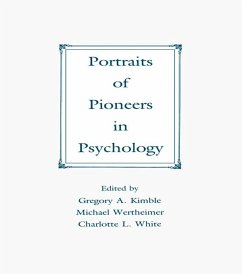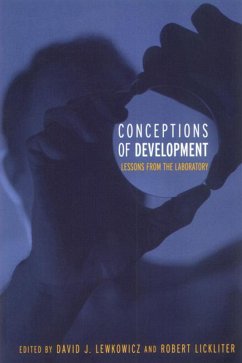
Portraits of Pioneers in Developmental Psychology (eBook, PDF)
Versandkostenfrei!
Sofort per Download lieferbar
49,95 €
inkl. MwSt.
Weitere Ausgaben:

PAYBACK Punkte
25 °P sammeln!
Utilizing an informal, sometimes humorous style of writing, this book brings to life 16 developmental psychologists who made a significant contribution to their field. Written by noted scholars, each chapter provides a glimpse into the personal and scholarly lives of these innovative "pioneers". Some of the chapters are based on the contributor's personal acquaintance with a pioneer allowing for the introduction of previously unavailable information. Suggested Readings allow readers to delve deeper into the material and a tabular list of subjects and authors helps instructors supplement their ...
Utilizing an informal, sometimes humorous style of writing, this book brings to life 16 developmental psychologists who made a significant contribution to their field. Written by noted scholars, each chapter provides a glimpse into the personal and scholarly lives of these innovative "pioneers". Some of the chapters are based on the contributor's personal acquaintance with a pioneer allowing for the introduction of previously unavailable information. Suggested Readings allow readers to delve deeper into the material and a tabular list of subjects and authors helps instructors supplement their courses in substantive areas of psychology with ease.
The introductory essay prepares the reader for a deeper understanding of the contributions of each of the pioneers. Mamie Phipps Clark had a profound impact on the education of American children. Robert W. White pioneered a new approach to the study of persons across the lifespan. Lois Barclay Murphy's perspective on the strengths of developing children foreshadowed later developments in positive psychology. Florence Goodenough pioneered new testing methods for children. John Paul Scott was a pioneer in the field of behavior genetics. The book also highlights the many contributions of European pioneers: Jean Piaget, Charlotte Bühler, Heinz Werner, and Lev Vygotsky. Their contributions were carried forward by J. McVicker Hunt in the U.S. and Helena Antipoff in Brazil. Arnold Gesell's film studies of children's development remain a landmark accomplishment. Lawrence Kohlberg pioneered the study of moral development across the lifespan. Roger Barker's studies on aggression and leadership among children eventually led to the development of ecological psychology. Eleanor "Jackie" Gibson was famous for her work on the "visual cliff" and for her research on perception and development. Finally, Sidney Bijou had a long career delineating ways to improve the lives of children. Pickren's concluding essay draws connections between the pioneers and how they contributed to the advancement of the field.
Intended as a supplementary text for undergraduate and/or graduate courses in the history of psychology and/or developmental, child, or lifespan psychology taught in psychology, education, and human development, this engaging book also appeals to those interested in and/or teaching these subject areas. Each of the 7 volumes in the Portraits of Pioneers Series contain different profiles bringing more than 140 of psychology's pioneers to life.
The introductory essay prepares the reader for a deeper understanding of the contributions of each of the pioneers. Mamie Phipps Clark had a profound impact on the education of American children. Robert W. White pioneered a new approach to the study of persons across the lifespan. Lois Barclay Murphy's perspective on the strengths of developing children foreshadowed later developments in positive psychology. Florence Goodenough pioneered new testing methods for children. John Paul Scott was a pioneer in the field of behavior genetics. The book also highlights the many contributions of European pioneers: Jean Piaget, Charlotte Bühler, Heinz Werner, and Lev Vygotsky. Their contributions were carried forward by J. McVicker Hunt in the U.S. and Helena Antipoff in Brazil. Arnold Gesell's film studies of children's development remain a landmark accomplishment. Lawrence Kohlberg pioneered the study of moral development across the lifespan. Roger Barker's studies on aggression and leadership among children eventually led to the development of ecological psychology. Eleanor "Jackie" Gibson was famous for her work on the "visual cliff" and for her research on perception and development. Finally, Sidney Bijou had a long career delineating ways to improve the lives of children. Pickren's concluding essay draws connections between the pioneers and how they contributed to the advancement of the field.
Intended as a supplementary text for undergraduate and/or graduate courses in the history of psychology and/or developmental, child, or lifespan psychology taught in psychology, education, and human development, this engaging book also appeals to those interested in and/or teaching these subject areas. Each of the 7 volumes in the Portraits of Pioneers Series contain different profiles bringing more than 140 of psychology's pioneers to life.
Dieser Download kann aus rechtlichen Gründen nur mit Rechnungsadresse in A, B, BG, CY, CZ, D, DK, EW, E, FIN, F, GR, HR, H, IRL, I, LT, L, LR, M, NL, PL, P, R, S, SLO, SK ausgeliefert werden.













